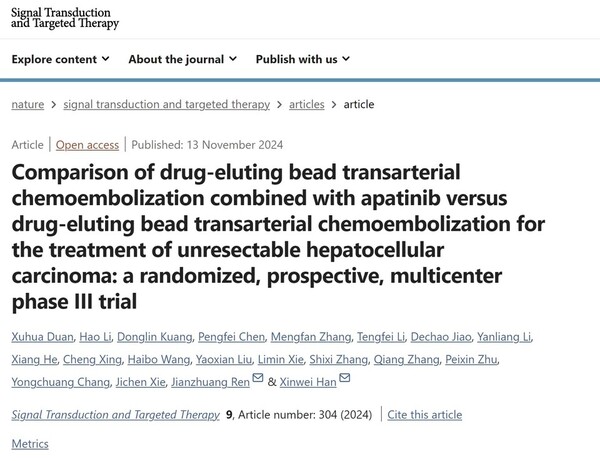A new study found the combination therapy of drug-eluting bead transcatheter arterial chemoembolization (DEB-TACE) plus rivoceranib (afatinib in China) significantly improved survival and response rates compared to the existing DEB-TACE monotherapy in patients with unresectable hepatocellular carcinoma.

The study, an investigator-initiated trial involving 243 patients at 12 hospitals in China, was published in Nature Signal Transduction and Targeted Therapy on Wednesday. Nature Signal Transduction and Targeted Therapy is one of Nature's sister journals, specializing in signal transduction and targeted therapy research in life sciences and medicine.
The study, which ran from January 2021 to June 2022, randomized participants to DEB-TACE monotherapy (121 patients) or DEB-TACE plus afatinib (122 patients). The primary endpoint was progression-free survival (PFS).
Results showed that PFS in the combination arm was 7.1 months (95 percent CI 6.6-8.3), longer than in the monotherapy arm (5.2 months, 95 percent CI 5.0-5.9) (p<0.001). Overall survival (OS) was also significantly improved in the combination arm (23.3 months, 95 percent CI 20.7-29.6) compared to monotherapy (18.9 months, 95 percent CI 17.9-20.1) (p<0.001).
Response rates were also better in the combination arm. The objective response rate (ORR) was 56.6 percent in the combination arm, compared to 38.8 percent in the monotherapy arm, and the disease control rate (DCR) was also higher in the combination arm (89.3 percent) than in the monotherapy arm (80.2 percent).
In addition, when patients were stratified into BCLC (Barcelona Clinic Liver Cancer) stage B (multiple intrahepatic tumors but no vascular involvement) and BCLC stage C (advanced liver cancer with portal involvement or extrahepatic metastases), the combination showed a more significant survival benefit than monotherapy in stage B patients, and the combination also showed positive results in stage C patients.
The combination of DEB-TACE and rivoceranib had a generally favorable safety profile. There were higher rates of hepatic artery spasm (34.5 percent vs. 21.7 percent) and hepatic artery stenosis (16.8 percent vs. 9.6 percent) in the combination arm compared to DEB-TACE alone, but these were largely manageable.
Major adverse events associated with rivoceranib included hypertension (43.4 percent), hand-foot syndrome (40.7 percent), fatigue (37.2 percent), and diarrhea (22.1 percent). However, serious adverse events were rare and were effectively managed with dose adjustments and short-term treatment interruptions.
The DEB-TACE plus rivoceranib combo therapy demonstrated superior survival and response rates to conventional DEB-TACE monotherapy in patients with unresectable HCC, showing promise as a new treatment option.
“Afatinib (rivoceranib) synergized with DEB-TACE through inhibition of angiogenesis to improve treatment outcomes,” the researchers concluded. “It has the potential to develop into an effective treatment strategy.”
However, the researchers noted that the Covid-19 pandemic made data collection and patient follow-up challenging, and the relatively small number of patients may have introduced bias into the data analysis, limiting interpretation of the results.
They also noted that the subsequent treatments patients received after the end of PFS (immunotherapy, targeted therapies, and other localized treatments) may have affected OS. They emphasized that the results should be interpreted with caution considering these factors.
HLB said the study demonstrates the clinical promise of the TACE plus rivoceranib combination and provides a positive signal for its strategy to expand rivoceranib indications. The company said it is preparing for the results of the U.S. Food and Drug Administration (FDA)’s New Drug Approval, which is expected early next year, as well as considering the expansion of its drug pipeline.
Related articles
- FDA regulations evolve as science changes: Elevar Therapeutics COO
- HLB resubmits liver cancer drug application to FDA, awaits decision by early 2025
- [BIO USA 2024] FDA rejection of HLB's rivoceranib approval linked to impact of Biosecure Act?
- Jiangsu to ‘reapply for US approval of rivoceranib combo therapy ASAP’
- HLB Group Chairman Jin buys HLB Innovation stock worth ₩280 million
- HLB scores key ESMO endorsement for liver cancer drug as FDA decision nears
- HLB slams FDA rejection rumors as stock swings; acquires peptide maker ANYGEN for ₩60 bil.
- FDA rejects HLB’s liver cancer drug again over Hengrui’s manufacturing failures, giving BMS upper hand
- HLB eyes July comeback as FDA hits liver drug with 2nd CRL over Chinese plant

